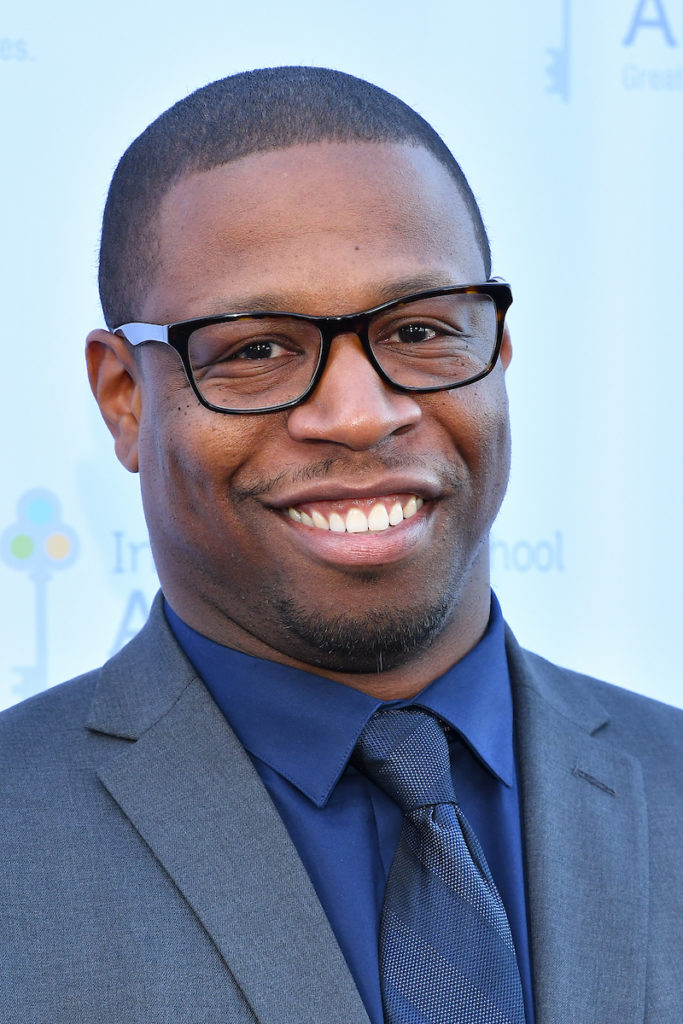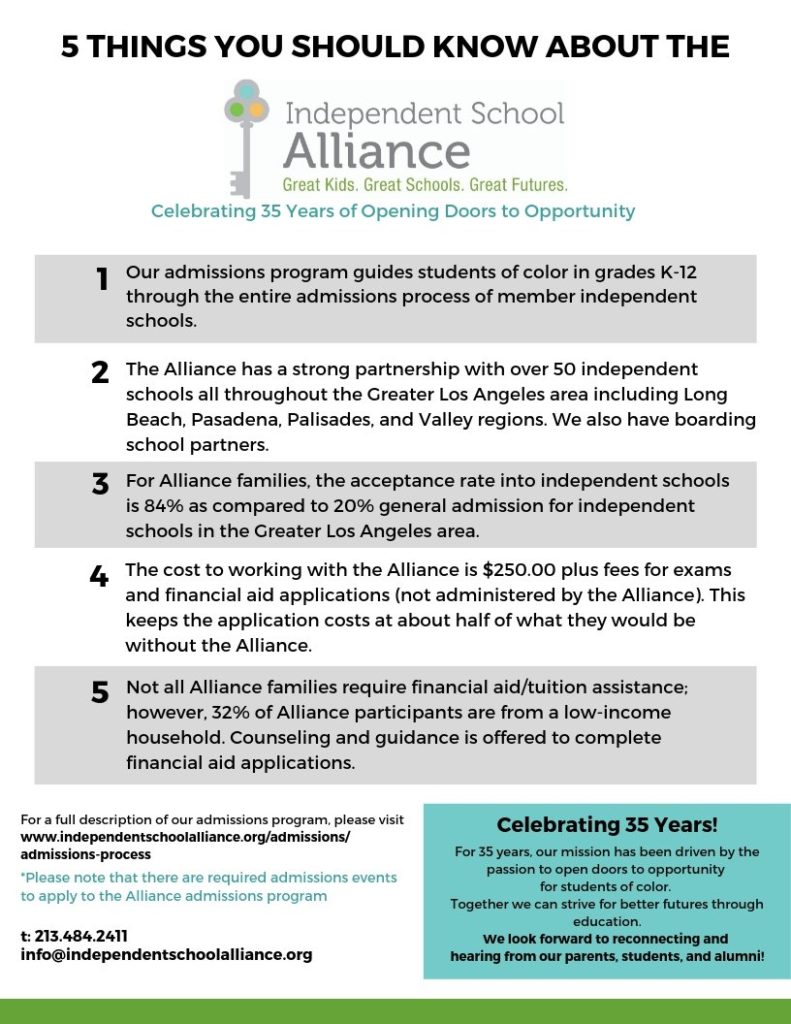I recently stopped by the Independent School Alliance for Minority Affairs (Alliance) to meet with executive director Robert Evans. I’ve been a longtime admirer of the work the Alliance does to help families of color navigate the competitive independent school (also commonly called private school) admissions process. In person, Robert is a wealth of information about school admissions. As a former independent school educator and current parent at a top school, Robert is a true insider who understands how school admissions really work. He also happens to be a very smart, friendly and outgoing guy who welcomes families to his office where, along with his staff, they roll up their sleeves and tackle all aspects of admissions. The goal? Acceptance to schools like Buckley, Brentwood, Campbell Hall, The Center For Early Education, Crossroads, Harvard-Westlake, John Thomas Dye, Polytechnic, Viewpoint, Walden and Westland to name a few. The admissions success rate for Alliance families speaks for itself: 84 percent of families are accepted to schools where they apply (the average acceptance rate for non-Alliance families is around 20 percent). The deadline to apply to work with the Alliance is August 1, 2019. Thank you Robert for your time and the work you do! –Christina

Q: How does the Independent School Alliance for Minority Affairs (Alliance) help families get into the most competitive private schools in Los Angeles and the San Gabriel Valley?
A: We understand that choosing the right school is by far one of the most important decisions that parents can make for their child. For 35 years, we have worked with our families to demystify the complexity of applying to independent schools. Our program takes a holistic approach to school admissions by providing general education about the various schooling options offered at our 50+ member schools; leading families through the application process; providing testing preparation services for students; matching families to schools that best meet their needs; and providing ongoing support for students in families throughout their educational career.
We offer workshops and resources on educational philosophies so that our parents understand the mission and vision of our 50+ unique member schools. Through our program, parents learn about progressive, developmental, project-based, constructivist, and traditional approaches to education. As parents consider the various schooling options, we perform an initial vetting in order to understand the best fit for their child’s strengths, personality, and learning style. When our member schools receive an application from the Alliance, they know and trust that we have worked hard to ensure a good match for all parties involved. Additionally, we take the stress out of the paperwork of applying as Alliance families complete ONE common application, which is honored by all of our member schools. We also offer fee waivers for the ISEE, FAST, and SSS, which make the cost of applying to independent school substantially lower than families who apply without the support of the Alliance.
Q: Do families have to demonstrate financial need to work with the Alliance? Also, do you assist families with the financial process at private schools?
A: The Alliance brokers substantial financial aid for an average of 80% of its students annually. We provide information regarding budgeting and financial planning for independent school education, and we work with our families to identify schools that are within the financial range of what they are able and willing to contribute. We are very proud to work with families of varying degrees of socioeconomic status as many of our families are considered low-to-moderate income while others are able to pay 50% to 90% of their tuition fees.
Tuition and fees vary according to the type of school (day school, boarding, etc.) and other factors. Although independent schools rely on tuition income as their major source of revenue, financial aid may be available to families who qualify. Details about financial aid policies and how to apply for financial assistance can be obtained from the individual schools.
Q: What percentage of Alliance families are accepted to schools where they apply?
A: Approximately 84% of the students who apply through the Independent School Alliance are accepted at one or more of our 50+ member schools. Such a high percentage rate of acceptance can be credited to personal counseling, appropriate recommendations, and solid matches between families and schools by the Independent School Alliance staff.

Q: How does your experience as an educator help the Alliance’s families find the right school?
A: I am fortunate to come into the role of Executive Director of the Alliance having previously taught in one of our member schools and having two of my children in another. As a parent, I understand the importance of community and believe in the culture of academic excellence that is supported at independent schools. I empathize with other parents with wanting my children to have educational success in an environment that nurtures their abilities, grows their interest, and helps to define their talents. As an educator, I also understand that students thrive in an environment that is built upon the foundation of relationships, respect, and rigor; and it is therefore important for a school to employ teachers who are committed to educating the whole child with love, care, and respect. As such, I have chosen to educate my children in the independent school environment and speak from firsthand knowledge about our experience in this community as a family.
Additionally, I am on the board of an organization that focuses on diversity, equity, and inclusion efforts in Southern California independent schools. This organization works in tandem with the support prong of the Alliance’s mission to provide resources, professional development, and opportunities for conversations, programming, and institutional changes to make our schools more equitable. My experiences as both a parent of children in independent schools and as an independent school educator has definitely informed my understanding of how best to serve Alliance families as they prepare to join the independent school community.
Q: The Alliance’s board of directors includes administrators from Archer, Crossroads, Harvard-Westlake and Wildwood. The board members serve terms, but you have a direct line to officials at highly selective schools every year. How do you use this access on behalf of ISA families?
A: We were fortunate to have independent school educators involved at the inception of the founding of our organization. Our governance committee of the board has determined that a quarter of our board must be comprised of senior administrators from our member schools at all times. This intentionality allows us to keep our fingers on the pulse of issues that affect independent schools. Additionally, each year we meet with our partners about their specific needs as a school and ensure that we are in communication about the changing landscape of admissions in independent schools. We engage in ongoing work with our member schools throughout each school year to increase diversity on their campuses while simultaneously working to eliminate inequitable barriers to educational access.
In thinking about how to best utilize our unique access to member schools, we have adopted a philosophy of family and student advocacy. Through mutual respect, communication, and understanding, we gain a commitment from our school partners to help our students and families gain access to a great education. Throughout the admissions process, we have frequent touchpoints with our member schools to ensure that our students and families have the most opportune chance of being considered for admission. Our strategic advocacy, intentional programming, and well-designed and organized support systems influence school decision makers about all the important issues that will affect the student, family, and school community.
Q: Is there a student who stands out in your mind as a great example of the partnership between the Alliance and a family?
A: Partnerships ensure that students are active participants in the learning process and parents are well- informed about their child’s educational experiences. Strong partnerships are built on regular, open communication about educational goals, as well as student academic achievement and personal development. These relationships are an integral part of quality education.
Parents play an essential and positive role in the life of an independent school and in the life of the Alliance as an organization. Not only are parents advocates for their children, but they also support the school and the Alliance through extensive volunteer activities and events.
There are a number of students that stand out as great examples of the partnership between families and the Alliance. One such example is found in the partnership between the Alliance and Kelsey and her mom, Roberta (both pseudonyms). Kelsey and her mom used our program twice for middle and again for high school. Kelsey was a reserved and soft-spoken student when she initially applied to our program; however, today, Kelsey is one of the Alliance’s biggest cheerleaders and she also serves as a Youth Ambassador. Kelsey supports us by attending our information sessions for outreach in the community and providing prospective Alliance families with anecdotes about her personal independent school experience. Her mom, Roberta, routinely volunteers to support the Alliance. She was most recently a greeter at our annual family end-of-school-year gathering. Whenever we ask, Roberta is there to offer the support and feedback that we need to improve our ability to meet the needs of our families and students. We truly appreciate the commitment and dedication of families such as Kelsey and Roberta and we are grateful for their ongoing support and family advocacy. We look forward to seeing how Kelsey continues to learn and grow during her educational career.
One success story that comes to mind is of Kalief (also a pseudonym), a young man who entered our program in the 6th grade. After graduating from a member school and an Ivy League college, Kalief returned to the Los Angeles area to serve as a teacher in one of our partner schools. In addition, Kalief also made his way back to the Alliance to support our mission as a teacher in our Student Orientation Program, which is designed as a transition program for new students. Last summer, when I walked into Kalief’s classroom, his students were reading the Declaration of Independence, the Ten-Point Plan of the Black Panther Party, and the Brown Beret Ten-Point Program. Kalief not only challenged his students to think through primary source documents for contextual understanding but to also extract information from these documents to make informed judgments related to decisions of the time. It was amazing to watch 6th graders grapple with issues of justice while simultaneously strengthening their reading and comprehension skills. Kalief used narrative comments, report cards, and test scores of our students to create personalized, needs-based, skills-based, and culturally competent class lessons. I sincerely appreciated the care and energy that he put into this learning experience and believe that his personal connection to the Alliance made the experience much more fruitful for our students.
For more information, contact the Independent School Alliance for Minority Affairs. The deadline to work with the Alliance is August 1, 2019! Information sessions will be held July 20 and August 1. 2019.
Stay up to date on the latest L.A. private schools news and events! Follow Beyond The Brochure on Facebook. Buy the book on Amazon.



